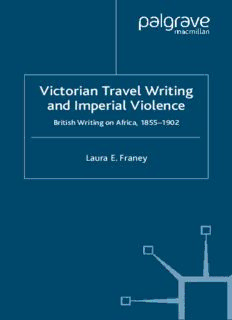
Victorian Travel Writing and Imperial Violence: British Writing of Africa 1855-1902 (Palgrave Studies in Nineteenth-Century Writing and Culture) PDF
Preview Victorian Travel Writing and Imperial Violence: British Writing of Africa 1855-1902 (Palgrave Studies in Nineteenth-Century Writing and Culture)
Victorian Travel Writing and Imperial Violence British Writing on Africa, 1855–1902 Laura E. Franey Victorian Travel Writing and Imperial Violence PalgraveStudiesinNineteenth-CenturyWritingandCulture GeneralEditor:JosephBristow,ProfessorofEnglish,UCLA Editorial Advisory Board: Yopie Prins, University of Michigan; Jenny Bourne Taylor, University of Sussex; Lindsay Smith, University of Sussex; Josephine McDonagh, Birkbeck College; Margaret D. Stetz, Birkbeck College; Hilary Fraser,UniversityofWesternAustralia Palgrave Studies in Nineteenth-Century Writing and Culture is a new monograph serieswhichaimstorepresentthemostinnovativeresearchintoliterarywriting andcultureproducedintheEnglish-speakingworldfromthetimeoftheNapo- leonicWarstothefindesie`cle. Attentivetothehistorical continuitiesbetween ‘Romantic’and‘Victorian’,theserieswillreassessthecriticalproblemofperiod- izationduringacenturythatmarkstrajectoriessuchastheemergenceofliberal- ism.Themainaimoftheseriesistolookattheincreasinginfluenceoftypesof historicismonouranalysisofliteraryformsandgenres.Itreflectsonthesignifi- cantshiftfromcriticaltheorytoculturalhistorythathasaffectednotonlythe period1800–1900buteveryfieldwithinthedisciplineofEnglishliterature.All titlesintheseriesseektoofferrefreshingnewperspectivesandchallengingnew readingsoftheperiod. Titlesinclude: LauraE.Franey VICTORIAN TRAVEL WRITING AND IMPERIALVIOLENCE British Writing on Africa,1855–1902 LawrenceFrank VICTORIANDETECTIVEFICTIONANDTHENATUREOFEVIDENCE TheScientificInvestigationsofPoe,DickensandDoyle Victorian Travel Writing and Imperial Violence: British Writing on Africa, 1855–1902 Laura E. Franey QLauraE.Franey2003 Allrightsreserved.Noreproduction,copyortransmissionofthis publicationmaybemadewithoutwrittenpermission. Noparagraphofthispublicationmaybereproduced,copiedortransmitted savewithwrittenpermissionorinaccordancewiththeprovisionsofthe Copyright,DesignsandPatentsAct1988,orunderthetermsofanylicence permittinglimitedcopyingissuedbytheCopyrightLicensingAgency,90 TottenhamCourtRoad,LondonW1T4LP. Anypersonwhodoesanyunauthorisedactinrelationtothispublication maybeliabletocriminalprosecutionandcivilclaimsfordamages. Theauthorhasassertedherrighttobeidentifiedastheauthorofthiswork inaccordancewiththeCopyright,DesignsandPatentsAct1988. Firstpublished2003by PALGRAVEMACMILLAN Houndmills,Basingstoke,HampshireRG216XSand 175FifthAvenue,NewYork,N.Y.10010 Companiesandrepresentativesthroughouttheworld PALGRAVEMACMILLANistheglobalacademicimprintofthePalgrave MacmillandivisionofSt.Martin’sPress,LLCandofPalgraveMacmillanLtd. MacmillanTisaregisteredtrademarkintheUnitedStates,UnitedKingdom andothercountries.PalgraveisaregisteredtrademarkintheEuropean Unionandothercountries. ISBN1-4039-0508-8hardback Thisbookisprintedonpapersuitableforrecyclingandmadefromfully managedandsustainedforestsources. AcataloguerecordforthisbookisavailablefromtheBritishLibrary. LibraryofCongressCataloging-in-PublicationData Franey,LauraE.,1971- Victoriantravelwritingandimperialviolence:BritishwritingonAfrica, 1855–1902/LauraE.Franey. p.cm.–(Palgravestudiesinnineteenth-centurywritingandculture) Includesbibliographicalreferencesandindex. ISBN1-4039-0508-8 1.Englishliterature–Africaninfluences.2.Englishprose literature–19thcentury–Historyandcriticism.3.Travelers’writings, English–Historyandcriticism.4.Africa–Descriptionand travel–Historiography.5.Travelers–Africa–History–19thcentury. 6.Violence–Africa–History–19thcentury.7.British–Africa–History–19th century.8.Imperialisminliterature.9.Africa–Inliterature.10.Violencein literature.I.Title.II.Series. PR129.A35F732003 828’.809355–dc21 2003051764 10 9 8 7 6 5 4 3 2 1 12 1110 09 0807 0605 04 03 PrintedandboundinGreatBritainby AntonyRoweLtd,ChippenhamandEastbourne Contents Acknowledgements vii Introduction 1 1 ‘‘TheDevil’sOwn Tattoo’’:Prefiguring Imperial Sovereignty in Exploration Narratives 10 Sovereignmarks 19 Sovereignmercy 36 Sovereignmedicine 41 Concludingremarks 45 2 ‘‘A Pulpy Mass of Churned-Up Flesh’’: Exploring the Complexity of Pulverization 47 ThecausesandconductoftheEminPashaReliefExpedition 48 Mutilationandpulverizationinpublicdiscourseabout theExpedition 52 Travelisdead,longliveEmpire 59 3 DamagedBodies andImperial Ideology in the TravelFiction of Haggard, Schreiner,and Conrad 67 Blood,guts,andglory:RiderHaggardand anachronisticviolence 70 ‘‘Thenoblestattributesofanimperialrule’’: SchreinerandvictimhoodinSouthernAfrica 75 Restrainingthe‘‘UnlawfulSoul’’inHeartofDarkness 95 4 Blurring Boundaries, Forming a Discipline: ViolenceandAnthropological Collecting 112 Thecaseoftheoverzealouszoologist 114 Ofskullsandskeletons 116 ScienceandsufferingontheEminPashaReliefExpedition 123 Bodiesandculturalanthropology 134 Concludingremarks 144 v vi Contents 5 ‘‘TonguesCocked andLoaded’’:Women Travel Writers and Verbal Violence 147 AmeliaEdwards:AppropriatingArabicmaledictions 150 CorneliaSpeedy:Winningwordytussles 154 MaryKingsley:Wide-ranginglinguisticmastery 158 Marginalization,empowerment,andthewrittenword 170 Epilogue 172 Notes 174 Workscited 200 Primarysources 200 Secondarysources 204 Acknowledgements Thisbookhascometofruitionthroughthegenerousaidandinspiration ofmanypeople.First,IwouldliketothankAliBehdadforintroducing me to Victorian travel narratives and for providing excellent guidance duringearlystagesoftheproject.AnneMelloralsosupervisedmyearly efforts graciously and continues to be a fine mentor and supporter. Otherswhograciouslyreadandvoicedconstructivecriticismofsections of the book include Robert Aguirre, Albion Urdank, and the Works- in-Progress group of the Millsaps Arts and Letters Division: Anne Mac- Master, Elise Smith, Bob McElvaine, Sandy Zale, Kristen Tegtmeier, Bill Storey,AdolfoCacheiro,andVeronicaFreeman.ColleaguesintheHeri- tage of the West in World Perspective program – David Davis, John Thatamanil, Michael Gleason, Patrick Hopkins, and Steve Smith – en- couragedmyalready-presentinterestininterdisciplinaryscholarshipby sharingtheirknowledgeofworldhistory,religiousstudies,classics,and philosophy. TheannualDickensUniverse(hostedbytheUniversityofCalifornia, Santa Cruz) spawned ideas and relationships that have played an important role in the creation and completion of this project. I am especially grateful to Dickens Universe participants Joseph Childers, JamesKincaid,andPaulSaint-Amournotonlyfortheirfriendlysupport andadvicebutalsofortheirmodelingofincisive,insightful,andwitty scholarship. Inaddition,Iamgratefultotheresearchlibrariansandsupportstaffs attheBritishLibrary(especiallythoseintheManuscriptsDepartment), the Royal Geographical Society, and the Millsaps College Library. IgreatlyappreciatetheheroiceffortsofJanAllisonandTomHenderson atMillsapstoacquirethematerialsIneeded,sometimesatshortnotice. Also,fundingforafinalvisittotheBritishLibrarytoreadmanuscripts associated with Henry M. Stanley’s Emin Pasha Relief Expedition was providedbyaFacultyDevelopmentGrantfromMillsaps. At Palgrave, editors Eleanor Birne, Emily Rosser, and Paula Kennedy haveprovidedenthusiasmfortheprojectandpatientoversightduring the process of its production. I also appreciate the hard work and in- sightsofmycopy-editor,JaneyFisher. AnabridgedversionofChapter4waspublishedinVictorianLiterature and Culture 29.1 (2001) and is used here by permission of Cambridge vii viii Acknowledgements University Press. The image on the book jacket is reprinted by permis- sionoftheRoyalGeographicalSocietyPictureLibrary. Iamgratefultogoodfriendsovertheyears–particularlyMariaDoyle, Jill Galvan, Danielle Price, Elliott Visconsi, Adam Wasson, David Wit- zling,andPriscillaYbarraatUCLA,andAnneHardcastle,JulianMurch- ison, Sandra Smithson, and Tracy Sullivan at Millsaps – with whom I have enjoyed movies, camping trips, baseball games, costume parties, and the general high points and low points of academic life. Sangeeta Mehta,whomIfirstmetinanundergraduateseminar,continuestobea kind and nonjudgmental friend. Family relationships have also been very significant over the near-decade of devotion that has led to this book’s publication. I would like to thank my grandparents, James and MadelineCarlin,myparents,JamieandLarryFraney,mysisters,Lynn, Janet,andJordan,andmybrothers,JohnandLance,forbeinginterested intheworkIwasengagedinandfornotstoppingmewhenIoccasion- allylaunchedintowhattheynodoubtconsideredlong-windeddisquisi- tionsonabstrusetopics. ForhelpinginitiateandnurturemyinterestinBritishlifeandculture, IamgratefultoDesmondandDorinaSweeneyandDaniellePrice.Along with their adult children Laurence, Michael, and Mary, the Sweeneys gavememyfirsttasteoflifeintheUnitedKingdomwhenIstayedwith theminSwansea,SouthWales,in1980.OnmysecondtriptotheUK,a tripthatcametogetherhurriedlybutthatprovedrewardingprofession- allyandpersonally,Daniellegraciouslyshowedmetheresearchropesat theBritishLibrary(andnevercomplainedaboutmydrivingduringour visittotheLakeDistrictandEdinburgh). IoweanimmensedebttoJosephBristow–theeditorofthisseriesbut alsoamentorandfriendwhosezestforlifeinspiresme.Agreatdealof what I know about teaching, research, writing, and service has come from observing Joe in action as he fearlessly takes on new projects, researches thoroughly for his articles and books, closely supervises graduate student teachers and researchers, and creates and maintains friendships.NotonlyisJoethehardest-workingpersonIknow,heisalso the best close reader I have encountered. For his careful reading of various drafts and his subtle shaping of my writing style, I am very thankful. Most of all, though, I am indebted to Boty McDonald, a remarkable manwhoseabilitytomakeeachpersonhemeetsfeelspecialandvalu- ablehastransformedmylife. Introduction When we have them in our hands, we will then be able to do manythingswhicharequiteimpossibleforustodayandwhich will perhaps allow us to capture their minds after we have capturedtheirbodies. (CharlesRichardEtude,Frenchmilitaryofficerin Egypt,1845–46)1 In his best-selling adventure novel She (1887), H. Rider Haggard placedinthemouthofacenturies-old‘‘whitequeen’’rulingoverblack Africans inafictionalkingdom inCentralAfricathefollowingexplan- ationofherempire’sday-to-dayfunctioning:‘‘HowthinkestthouthatI rule this people? I have but a regiment of guards to do my bidding, therefore it is not by force. It is by terror. My empire is of the imagin- ation.’’2Alargebodyofinterdisciplinaryanddiscipline-specificscholar- shipinthepasttwodecadeshasinessenceappliedAyesha’ssentimentsto astudyofEuropeanimperialismbyexploringtheideathatthesuccessof imperial rule was not primarily due to force but rather to such non- somatic means as psychological coercion, the introduction of new religiousframeworksthatunderminedtraditionalnotionsofauthority, and collaboration between colonial officials and indigenous rulers. Edward Said’s Orientalism (1978) represents an early example of this conception of the ‘‘empire of the imagination,’’ with later influential articulations being found in the work of Mary Louise Pratt on travel andscientificclassification,PaulCarter’sconcernwithexplorers’naming of geographical features, Gauri Viswanathan’s exploration of Anglo- Indian educational policy and, finally, the analysis of ceremonies and culturalpracticesinTheInventionofTradition(1983),acollectionofessays editedbyhistoriansE.J.HobsbawmandTerenceRanger.3 1
